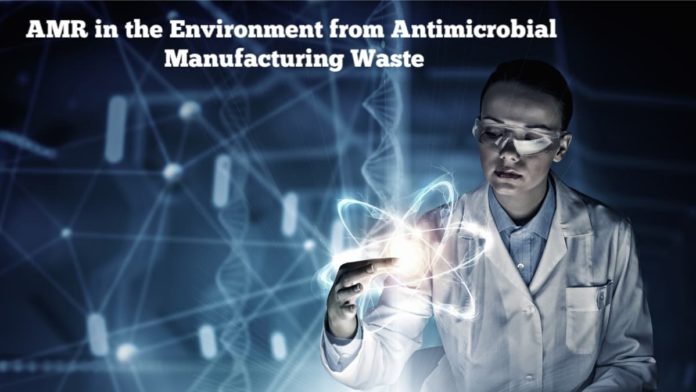DBT India & NERC UK Opportunity for Funding – Applications Invited
The official notification for the The Department of Biotechnology (DBT), Ministry of Science & Technology, Government of India, and the Natural Environment Research Council (NERC), on behalf of UK Research and Innovation (UKRI), UK, Opportunity for Funding under “India-UK Tackling AMR in the Environment from Antimicrobial Manufacturing Waste” has been released. Check details below:
The call expires in :
Opportunity for Funding under “India-UK Tackling AMR in the
Environment from Antimicrobial Manufacturing Waste”
———————————————————-
Closing date (Notification of Intent): 16:00 BST / 20:30 IST on 14 October 2019
Closing date (Full Proposals): 16:00 BST / 20:30 IST on 12 November 2019
1. Summary
The Natural Environment Research Council (NERC), on behalf of UK Research and
Innovation (UKRI) and the Department of Biotechnology (DBT), Ministry of Science and
Technology, Government of India are inviting collaborative and cross-disciplinary research
proposals under the India-UK “AMR in the Environment from Antimicrobial Manufacturing
Waste” Call.
This call aims to support new research to inform the development of strategies to limit
environmental contamination by antimicrobial waste from pharmaceutical manufacturing,
with the ultimate aim to contribute to global efforts to contain
infections of humans and animals.
Proposals are sought for collaborative and cross-disciplinary research projects involving
researchers from both the UK and India. Up to £3.8m (80% FEC) is available from NERC to
support eligible UK based researchers, and matched in terms of research effort from DBT to
support eligible Indian researchers.
Applicants can request up to £800,000 (80% FEC) for the UK component of a project, and
matched in terms of research effort for the Indian component. It is expected that up to five projects will be funded. The maximum duration of projects is 3 years and projects are
expected to start in June 2020.
NERC is managing the call on behalf of the UKRI and DBT partnership. A Notification of
Intent to Submit Proposal should be submitted on the online form through the NERC website no later than 16:00 BST / 20:30 IST on 14 October 2019. The notifications will not be assessed and will be used to plan the assessment process. Applicants should note that submission of a Notification of Intent is an obligatory requirement of this call and full proposals will only be accepted from those teams who submit a completed Notification of Intent form prior to the deadline.
A joint application should be submitted to the UK’s Joint Electronic Submission
System (Je-S). The closing date for applications is 16:00 BST / 20:30 IST on 12
November 2019. Applications not submitted before the deadline will not be received or
considered. After Je-S submission, The UK PI should download and share the full proposal
with the Indian PI. The Indian PI should also submit an identical copy of the full Je-S
proposal by email to DBT (at [email protected]) within the deadline.
The closing date for Full Proposals is 16.00 BST / 20.30 IST on 12 November 2019
2. Background
2.1 Funders
UK Research and Innovation (UKRI) is the UK’s main public research and innovation funding agency, which works in partnership with universities, research organisations, businesses, charities, and government to create the best possible environment for research and innovation to flourish. This call is supported by the UKRI Fund for International Collaboration, which aims to enhance the UK’s excellence in research and innovation through global engagement, forging new bilateral and multilateral research and innovation programmes with global partners. For practical purposes, the Natural Environment Research Council (NERC), is leading this call on behalf of UKRI, which welcomes interdisciplinary research approaches and research topics that span the remits of the UKRI Councils.
The Department of Biotechnology (DBT), Ministry of Science and Technology, Government
of India, is entrusted upon promotion of research, development and innovation in the field of biotechnology. DBT funds and supports all Indian universities, research organizations, nongovernmental organizations and industry working in the area of biotechnology. The DBT has promoted and reinforced the development of innovations in biotechnology, and life sciences with far-reaching impacts in fields that range from health, agriculture, environment to animal sciences and industry.
2.2 Scientific Background
Antimicrobial resistance (AMR) is a global public health challenge, with antibacterial
resistance (ABR) viewed as posing one of the most serious health threats. Bacteria are
present everywhere, including in every living being and in the soil, water, sediment and air.
With interconnected ecosystems (including humans, animals, the environment), the
exchange of bacteria is continuous, and thus the ABR problem is not restricted to medical
science alone. Understanding this problem requires effective collaboration among several
disciplines.
The role of the environment in the evolution and dissemination of antibiotic-resistant bacteria is increasingly gaining attention. A growing number of published studies indicate high levels of antibiotics, antibiotic-resistant bacteria and antibiotic resistance genes in various environments around the world particularly those impacted by sewage, agriculture and pharmaceutical manufacturing effluent. This accumulation creates the conditions for the proliferation and transmission of resistant bacteria from the environment directly to humans as well as through selection and horizontal gene transfer from commensal to pathogenic bacteria.
The role of antimicrobial manufacturing pollution is particularly pertinent in India. It is
estimated that 80% of antibiotics sold by multinational antimicrobial companies on the global market are manufactured in Asia and there are at least 40 antibiotic active pharmaceutical ingredient (API) manufacturers and at least 250 pharmaceutical formulation companies manufacturing at least one antibiotic in India. Whilst the significance of the impact manufacturing waste might have on the environment is unclear, there is potential for highlevels of localised contamination because of the large quantity of antimicrobial waste generated during the production process relative to the diffuse environmental exposure that may result from patient or animal use. Recent studies have shown that some wastewater effluents from antibiotic manufacturing units contain a substantial amount of antibiotics, leading to contamination of rivers and lakes. The manufacturing process can also potentially contaminate environments through vaporisation or other solid waste disposal methods.
Current global discharge standards for pharmaceutical industry waste do not include
antibiotic residues and consensus around safe limits for antibiotic discharge has yet to
emerge. Through the AMR Industry Alliance, the pharmaceutical industry is taking voluntary
action to reduce the environmental impact from antimicrobial manufacturing by committing to
(i) establish a common framework for managing antibiotic factory discharges, (ii) develop a
a mechanism to demonstrate supply chains meet the standards set, and (iii) agreeing, by
2020, targets on antibiotic levels released in waste discharge. In September 2018 the AMR
Industry Alliance published science-driven, risk-based targets for discharge concentrations
of antibiotics, which will be updated periodically as new reliable and robust data become
available. The Access to Medicines Foundation’s AMR Benchmark provides an independent
evaluation of how pharmaceutical companies are slowing the rise of drug resistance. The
2018 Benchmark includes environmental stewardship metrics and will be updated for
release in 2020. However, to date there has been no systematic monitoring conducted and
significant knowledge gaps remain around the scale of contamination and the risks
presented to the environment and humans, and this knowledge is needed to determine
whether existing regulatory approaches to manage discharges are appropriate and reflect
the latest science.
India and the UK both play a leadership role in global efforts to contain AMR via the UN
Interagency Coordination Group on Antimicrobial Resistance and national action plans that
highlight the role of the environment in the spread of AMR and the importance of
international collaboration. Joint research on the impacts of the global supply chain of
antibiotic manufacturing will, therefore, contribute towards the reduction of the global impacts of AMR.
3. Scope
3.1 Programme objectives
This programme aims to support new research to inform the development of strategies to
limit environmental contamination by waste from antimicrobial manufacturing, with the
ultimate aim to contribute to global efforts to help contain resistant bacterial infections of
humans and animals.
This initiative is targeted at resistant bacteria of humans and animals rather than other
classes of pathogens. Proposals that are relevant to other classes of pathogen will be
permissible only if the primary focus is clearly bacteria.
Research will focus on the situation in India, as a major producer of antimicrobials in the
global supply chain of the healthcare industry, and a scientifically appropriate place to study this global issue. The research outcomes will contribute to assessing the human, animal and environmental health risk that this source of antimicrobial exposure to the environment represents, and to the development of international environmental standards for antimicrobials in manufacturing effluent and receiving environments.
Recent AMR scoping activity supported by DBT and UKRI identified the following knowledge
gaps, which this programme will refine and seek to address:
• Understanding the extent of antimicrobial pollution from antimicrobial manufacturing
waste (wastewater, solid waste and atmospheric emissions), its pathways through
environmental systems, and its role in driving emergence and circulation of AMR in
the environment. Challenges exist around understanding the selective and coselective pressures of environmentally relevant mixtures of antibiotics and other
chemicals on complex microbial communities, and spatial and temporal variations
caused by production cycles, geography, climate and socioeconomic factors.
• Development and validation of globally relevant standardised methods and tools for
detection of active antimicrobials and resistant bacteria in effluents and receiving
environments. Challenges exist around integrating a suite of low cost, easy to use,
chemical, biological, mass-balance and other tools that can be validated in a range of
matrices, and are applicable over a broad analytical range.
• Determining the impact on human and animal health from environmental exposure to
high levels of antimicrobial pollution and resistant bacteria and genes. Challenges
exist around understanding how communities in areas with antibiotic manufacturing
industry are exposed to antibiotics and resistant bacteria through their interactions
with the environment (particularly through use of water systems, including
wastewater channels), relative to communities with lower levels of exposure, and
whether there is an enhanced risk of health impacts in these areas.
Projects must address at least one of the above research challenges with a view to research outputs contributing to ongoing efforts to develop international environmental standards to manage the discharge of effluent from antimicrobial producers
Engagement with antimicrobial producers, pollution control agencies, health protection
agencies and other stakeholders in the research design is strongly encouraged.
3.2 Proposal requirements
The research and innovation will be delivered through bilateral joint projects. Projects must
be genuine and equal collaboration between UK and Indian researchers, and be focussed
on research in the Indian environment, although may include well-justified comparative
studies in other locations.
4. Programme requirements
4.1 Programme funding
NERC is managing the bid submission on behalf of the UKRI and DBT partnership.
Applications to the UK-India AMR in the Environment from Antimicrobial Manufacturing
Waste programme must include UK-Indian partnerships – i.e. include at least one Indiabased Principal Investigator and one UK-based Principal Investigator. Only proposals that involve research collaboration between the UK and India will be considered.
The programme is a partnership between UKRI in the UK and the Department of Biotechnology (DBT), Ministry of Science and Technology in India. UKRI has £3.8m (80%FEC) available for this programme to fund the successful grant proposals. DBT has matched funding in terms of research effort. Applicants can request up to £800,000 (80%FEC) for the UK component of a project, and the equivalent in terms of research effort from DBT for the Indian component.
For each grant application, a lead Principal Investigator should be nominated from both the
UK and India, and they will act as focal points for contact with the funding agency in their
respective countries. UKRI and DBT anticipate funding up to five collaborative projects.
4.1.1 Studentships
No PhD studentships are allowed on the UK components of this call. DBT will fund Indian
manpower costs as per DBT norms. Investigators from India are required to follow
“Modalities of Participation and Funding AMR Environment Call”.
4.2 Implementation and delivery
The maximum duration of the projects is 36 months. Successful projects are expected to
start in June 2020.
Projects must be genuinely collaborative and applicants should demonstrate how the team
will work together to deliver the interdependent project outcomes. Projects will also be
expected to participate in an annual programme meeting and should include within their
projects budget allowance for key members to attend this meeting. These meetings will most likely be held in India so applicants should budget for their costs on this basis. Additional funding will be made available after awards are made for a UK and Indian group to take the lead on arranging the annual meeting and coordinating joint reporting and communications for the programme.
4.3 Knowledge Exchange and Impact
Knowledge exchange (KE) is vital to ensure that research has wide benefits for society, and
should be an integral part of any research.
All applicants must consider how they will or might achieve impact outside the scientific
community and submit this with their application as a Pathways to Impact statement, with associated delivery costs where relevant. Pathways to Impact activities do not have to be
cost-incurring; it is not a requirement to include funded activities. Any funds required to carry out any proposed, outcome-driven activities identified within the Pathways to Impact must be fully justified within the Justification of Resources statement.
The Pathways to Impact will identify those who may benefit from or make use of the
research, how they might benefit or make use of the research, and methods for
disseminating data, knowledge and skills in the most effective and appropriate manner.
Acceptable Pathways to Impact is a condition of funding. Grants will not be allowed to
start unless unacceptable Pathways to Impact are enhanced to an acceptable level within
one month of notification of the panel outcome.
All funded projects may also be required to engage with programme-wide KE activities, in
which case appropriate funding for which will be provided by the programme.
4.4 Data Management
The NERC Data Policy must be adhered to, and an outline data management plan produced
as part of proposal development. NERC will pay the data centre directly on behalf of the
programme for archival and curation services, but applicants should ensure they request
sufficient resource to cover preparation of data for archiving by the research team.
Applicants to this call should give full consideration to the practical requirements for data
sharing both within the research teams and to the wider community and describe how this
will be conducted. Applicants should ensure that they have requested appropriate resources
for data management and data sharing. Indian PIs of the consortium should apply to their
institutional review boards (IRBs)/ institutional ethics committees (IECs) at the time of
submission of proposal to obtain necessary ethics approvals from all involved institutions.
Please also refer to the Indian Funding Modalities document.
4.5 NERC Facilities
Prior to submitting a proposal, applicants wishing to use a NERC service or facility must
contact the facility to seek agreement that they could provide the service required.
Applicants wishing to use most NERC facilities will need to submit a mandatory ‘technical
assessment’ with their proposal. This technical assessment is required for aircraft but not for NERC Marine Facilities (NMF – Shiptime and/or marine equipment) and HPC. For NERC,
this means a quote for the work which the facility will provide. A full list of the Facilities
requiring this quote can be found on the NERC website. The costs for the service or facility
(excluding NMF and HPC costs) must be included within the Directly Incurred Other Costs
section of the Je-S form and also within the facilities section of the Je-S form. Further
information on NERC services and facilities can be found on the NERC website.
4.6 Reporting requirements
As with all NERC grants, there will be a requirement to report research outputs through the
UKRI reporting system; this is required annually and continues for up to five years post-grant end. In addition, grant-holders will be required to report to NERC bi-annually on progress and achievements. Indian grant holders will also be required to adhere to follow the standard reporting requirements of the Department of Biotechnology.
5. Application process
5.1 Notification of Intent
A Notification of Intent to submit a proposal must be submitted for all potential
proposals to the call via the online application form by 16:00 BST / 20:30 IST 14
October 2019.
Only one Notification of Intent form needs to be submitted per project. The notification must follow the instructions provided on the online form and include details on the research
themes that the proposed research will address and the institutions, investigators and project partners that are expected to be involved. NERC and DBT will use this information to plan the proposal assessment process. It should be noted that submission of the Notification of Intent is a requirement of this call and full bids will only be accepted from those teams who submit a completed Notification of Intent to submit the online form prior to the deadline. The Notification of Intent form is available from the Announcement of Opportunity page on the NERC website.
It is expected that proposals will evolve between the Notification of Intent and the Full
Proposal (including personnel and partnerships), but the major research elements are
expected to remain broadly the same, within the confines of any feedback from the
Notification of Intent stage. Similarly, the Principal Investigator should not change between
the Notification of Intent and Full Bid stages. Applicants considering any significant changes
in the scope of a project should agree any significant proposed changes with NERC prior to
submitting their Full Proposals.
5.2 Full Proposals
Closing Date: 16:00 BST / 20:30 IST 12 November 2019
This programme will support collaborative projects between the UK and India and each
project should submit a joint proposal that sets out the research to be carried out by both the UK and Indian partners. All proposals must include researchers from the UK and India. The UK applicant must submit the proposal on behalf of the consortium through the Research Councils’ Joint Electronic Submission system (Je-S).
Once the UK PI has submitted the application through Je-S, the UK PI is requested to
download the application and share this with their Indian PI who should also submit it to
DBT.
The UK applicant should list the Indian collaborators as Project Partners on the Je-S form.
Each individual organisation should be listed as a separate Project Partner. The approximate
value of the Indian collaborators and other contributions should be recorded in the project
partner in-kind support section of the proposal form.
The following additional attachments must be provided on the lead proposal:
• CVs for each of the named Indian collaborators (maximum 2 pages per person)
should be combined into one document as attachment type ‘Non-UK Components’.
• Completed DBT proposal submission proforma as attachment type ‘Non-UK
Components’ which summarises details of the Indian applicants and their requested
costs (see Indian Costs below).
Indian researchers must submit the proposal as a single consolidated PDF file by email to [email protected] using the proforma provided, with reference to the modalities of “Participation and Funding for Indian Investigator(s)’. Both these documents are available on the Announcement of Opportunity page on the NERC website.
Successful grants will have their UK costs paid through Je-S and their Indian costs paid
through DBT’s system.
Applicants should select Proposal Type – ‘Standard Proposal’ and then select the Scheme –
‘Directed’ and the Call – ‘Tackling AMR in the Environment India’.
The UK-India Tackling AMR in the Environment from Antimicrobial Manufacturing
Waste call will close on JeS at 16:00 BST / 20:30 IST on 12 November 2019 and it will not be possible to submit to the call after this time. Applicants should leave enough time for their proposal to pass through their organisation’s Je-S submission route before this date. Any proposal that is incomplete, or does not meet NERC’s and DBT’s eligibility criteria or follow NERC’s submission rules (see NERC Grants Handbook), will be office rejected and will not be considered.
All attachments, with the exception of letters of support and services/facilities/equipment
quotes, submitted through the Je-S system must be completed in single-spaced typescript of minimum font size 11 point (Arial or other sans serif typeface of equivalent size to Arial 11), with margins of at least 2cm. Please note that Arial narrow, Calibri and Times New Roman are not allowable font types and any proposal, which has used either of these font types within their submission, will be rejected. References and footnotes should also be at least 11 point font and should be in the same font type as the rest of the document. Headers and footers should not be used for references or information relating to the scientific case. Applicants referring to websites should note that referees may choose not to use them.
Applicants should ensure that their proposal conforms to all eligibility and submission rules,
otherwise, their proposal may be rejected without peer review. More details on NERC’s
submission rules can be found in the NERC research grant and fellowships handbook and in
the submission rules on the NERC website.
Proposals for this call should be submitted in NERC standard grant format following the
requirements outlined in Section F of the NERC research grant and fellowships handbook.
Please note that on submission to council ALL non PDF documents are converted to PDF,
the use of non-standard fonts may result in errors or font conversion, which could affect the overall length of the document.
Additionally where non-standard fonts are present, and even if the converted PDF document may look unaffected in the Je-S System, when it is imported into the Research Councils Grants System some information may be removed. We, therefore, recommend that where a document contains any non-standard fonts (scientific notation, diagrams etc.), the document should be converted to PDF prior to attaching it to the proposal.
The expected start date for projects funded under this Announcement of Opportunity is June 2020.
5.2.2 Full Proposal components
In addition to the standard Je-S pro forma, the lead component of each proposal should
include the following documents:
1. A Case for Support comprising:
a) A common Previous Track Record incorporating all UK and Indian Research
organisations involved in this proposal (up to 2 sides of A4).
b) A common Description of the Proposed Project (up to 8 sides of A4 including all
necessary tables, references and figures) to include:
i) Underlying rationale and scientific issues to be addressed.
ii) Specific interdependent objectives of the project, including their relevance to
objectives of the call.
iii) Methodology and approach.
iv) Risks and mitigation strategies.
v) Programme and/or plan of research, evidence of access to required facilities, data,
collections.
vi) Ethical considerations, in particular for projects with human participants and the
sharing of biological material.
2. UK Costs: a common Justification of Resources (up to 2 sides of A4). This should be for all UK Research Organisations involved, for all Directly Incurred Costs, Investigator
effort, use of pool staff resources, any access to shared facilities and equipment. For
further information on what to include in the Justification of Resources, see section E in the
NERC Research Grants Handbook.
3. Indian costs: justification of these resources and details of the Indian Investigators
should be submitted on the separate form provided and entered into Je-S as attachment
type ‘Non-UK Component’. For full details of eligible costs please refer to the
‘Modalities of Participation and Funding for Indian Investigator(s)’. Both documents are
available to download from Announcement of Opportunity page on the NERC website.
4. A common Pathways to Impact (up to 2 sides of A4), detailing:
a) Those who may benefit or make use of the research;
b) How they might benefit and/or make use of the research; and
c) Methods for disseminating data/knowledge/skills in the most effective and appropriate
manner.
Full details of the requirements for Pathways to Impact, and a suggested template can be
found on the NERC website. The costs of knowledge exchange activities in the plan should
be fully integrated into the proposal costings and justified in the Justification of Resources
section.
5. A common Outline Data Management Plan (up to 1 side of A4). This section includes information about how the project will manage data produced and identify data sets of long term value that should be made available to the relevant data centre for archiving and reuse at the end of the grant. Further guidance regarding NERC’s Data Policy is available.
6. Project Partner Letter(s) of Support (up to 2 sides of A4 each). A Letter of Support is required from each named Project Partner. This letter should confirm that the support
and facilities required to enable the associated collaborations will be made available. The
Je-S system will require a letter of support for the Indian collaborators listed as Project
Partners. A ‘dummy letter of support’ should be submitted and indicated that this is
the letter of support for the Indian named collaborator.
Each component proposal (including the lead) will additionally require the following
attachments, where applicable:
a) A CV (up to 2 sides of A4) for each named PI, Co-I, research staff post and Visiting
Researcher.
b) PIs wishing to use NERC facilities will need to submit a mandatory ‘technical
assessment’ with their proposal (excluding HPC) as detailed in section 4.5 above.
NERC Services and Facilities must be costed within the limits of the proposal, and
agreement that they can be undertaken within the timeframe of the spend must be
provided by the facility. This means a quote for the work which the facility will provide.
A full list of the Facilities requiring this quote can be found on the NERC website.
5.2 Eligibility
5.2.1 UK researchers
Normal individual eligibility applies and is in Section C of the NERC research grant and
fellowships handbook. Research Organisation eligibility rules are in Section C of the
handbook.
NERC research and fellowship grants for all schemes may be held at approved UK Higher
Education Institutions (HEIs), approved Research Council Institutes (RCIs) and approved
Independent Research Organisations (IROs). Full details of approved RCIs and IROs can be
found on the UKRI website.
UK Investigators may be involved in no more than two proposals submitted to this call and
only one of these may be as the lead UK Principal Investigator.
5.2.2 Indian researchers
All Indian researchers generally eligible to apply for DBT funding opportunities are eligible to apply as Principal Investigators from India. Please refer to the ‘Modalities of Participation
and Funding for Indian Investigator(s)’ for further consideration.
6. Assessment Process
Proposals will be internationally peer-reviewed and final funding recommendations made by
a panel consisting of independent experts. Applicants will be given the opportunity to provide a written response to peer review comments prior to the panel.
The assessment criteria to be used will be:
• Research Excellence
• Fit to Scheme including:
o Relevance to the programme aims and objectives
o How well the project addresses the identified research challenges
o Potential for impact
o Evidence of a genuine collaboration between the UK and Indian partners
Feedback will be provided to both successful and unsuccessful applicants.
NERC and DBT will use the recommendations of the panel along with the overall call
requirements and the available budget in making the final funding decisions. The Funders
are aiming to achieve a balanced portfolio of projects across the programme that best
address the overarching aims of the programme.
7. Timetable
• Announcement published: w/c 19 August 2019
• Deadline for submission of Notification of Intent 14 October 2019
• Deadline for submission of full proposals: 12 November 2019
• Peer review: November 2019 – January 2020
• Panel meets: February 2020
• Projects start: June 2020
8. Contact
For all enquiries, please contact:
• UK – Victoria Wickens ([email protected])
• India – Amit Parikh ([email protected])
Important Links:
- ANNOUNCEMENT OF OPPORTUNITY
- MODALITIES OF PARTICIPATION AND FUNDING FOR INDIAN INVESTIGATOR(S)
- PROPOSAL SUBMISSION PROFORMA FOR INDIAN INVESTIGATORS
ONLINE REGISTRATION
View Notification Below
Guidelines
Editor’s Note: DBT India & NERC UK, DBT India & NERC UK Opportunity for Funding – Applications Invited, DBT India & NERC UK Call for Proposals, DBT India & NERC UK Invitations to Apply, DBT India & NERC UK Waste Management Call for Proposals, DBT India & NERC UK Funding Opportunities, DBT India & NERC UK Latest News, DBT India & NERC UK Proposals Called, DBT India & NERC UK Funding Applications Invited, DBT India & NERC UK news, make sure you check out the Biotecnika Times Newsletter we have for free subscription.









































